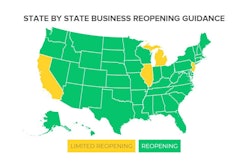
The Occupational Safety & Health Administration (OSHA) is entitled to “considerable deference” in addressing the COVID-19 pandemic, according to a June 11 federal appeals court decision. The ruling assures that the transportation construction industry is free to use proven workplace best practices to protect its workers, according to the American Road & Transportation Builders Association (ARTBA).
The Court of Appeals for the District of Columbia Circuit agreed with ARTBA’s position and denied an attempt to require the federal government to impose a single, rigid emergency standard for coping with COVID-19.
The ruling quickly turned away a request by the American Federation of Labor and Congress of Industrial Organizations (AFL-CIO) to compel OSHA to force implementation of a universal safety standard. Specifically, these organizations wanted OSHA to implement within 30 days a universal “emergency temporary standard” for infectious diseases which would cover all employees and all industries in response to the current pandemic.
ARTBA, in a filing made less than two weeks ago with other industry allies, urged the court not to grant the request because workers are better protected from the virus by construction industry best practices rather than a rigid “one-size-fits-all” regulation. The brief detailed why a uniform standard is misguided, explaining that “guidance on how to maintain the spread of COVID-19 in the aviation industry would naturally be quite different from guidance directed at the banking industry, or the construction industry.”
The court agreed, stating “[i]n light of the unprecedented nature of the COVID-19 pandemic, as well as the regulatory tools that the OSHA has at its disposal to ensure that employers are maintaining hazard-free work environments… the OSHA reasonably determined that an [emergency standard] is not necessary at this time.”


















